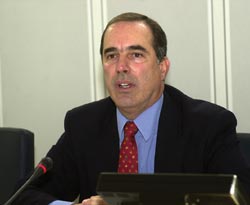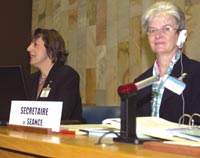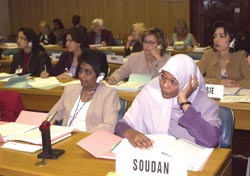Roberto Blois, ITU Deputy Secretary-General, put it
succinctly to the meeting: “The digital revolution promises many
opportunities, but they must be synergized to reach both women and men in the
developing countries and make a difference to their individual rights.” Mr
Blois will himself continue to oversee gender activities in the ITU on behalf of
the Secretary-General, Yoshio Utsumi.
To meet the challenges of its new mandate, WGGI’s areas of
activity, in parallel with ITU–D programmes, are:
• Regulatory reform.
• Technologies and telecommunications/ICT network
development.
• E-Strategies and E-Services development.
• Economics and finance, including cost and tariffs.
• Human capacity building.
• Information dissemination and networking.
The new mandate is a challenge to work more closely with the
entire ITU–D to implement gender initiatives in each Programme established under
the Istanbul Action Plan adopted at the World Telecommunication Development
Conference last March. This means that WGGI will encourage ITU–D to undertake
activities that will create gender sensitive environments in regulatory bodies;
take account of the gender perspective in tariff issues; develop the potential
to embrace new technologies; meet human resource development needs; and
concentrate on the rural areas that most need assistance.
Looking back, Hamadoun I. Touré, Director of the
Telecommunication Development Bureau (BDT), said that four years ago, “gender
equality was not a password in ITU” — the Task Force on Gender Issues had only
recently been established (March 1998). He added that “a gender perspective
was unheard of” and that “gender awareness guidelines were unthinkable”.
So TFGI has fulfilled its role of creating an environment of awareness both
within ITU and throughout its membership. TFGI has, through its advocacy and
activities, laid the foundations for gender issues in the telecommunication and
ICT context.

“The digital revolution promises many opportunities, but
they must be synergized to reach both women and men in the developing countries
and make a difference to their individual rights.”
Roberto Blois, ITU Deputy
Secretary-General
ITU 020116/A. de Ferron
|
Mr Touré listed the former Task Force’s major
accomplishments as including Gender Awareness Guidelines, an annual Gender
Survey Questionnaire, the ITU-D Gender website, partnerships with other
organizations and training of women operators to run a telecentre. The newly
converted Working Group on Gender Issues has “the advantage of a new beginning
and a new momentum not to be missed”.
Norway’s contribution of a gender expert to ITU-D for a
two-year period has been hailed as a major step forward. “I warmly thank the
Norwegian Post and Telecommunication Authority for their generous contribution
of gender expertise that will provide BDT with gender leadership and raise our
expectations even higher,” Mr Touré stated.
The meeting drafted a recommendation to the first Preparatory
Committee (PrepCom) for the World Summit on the Information Society (WSIS), held
in Geneva from 1 to 5 July 2002. In particular, the recommendation called for
the inclusion of gender at all levels of the WSIS preparatory process and
established a WGGI/WSIS Coordination Committee with the mandate to:

ITU 020119/A. de Ferron
|
• Encourage and promote the inclusion of gender specialists
and women experts in delegations from government, non-governmental organizations
and other civil society organizations to PrepCom meetings and WSIS 2003 and
2005.
• Promote the inclusion of the Millennium Declaration Goals
as important aspects to be considered in the context of the information society,
in particular as concerns poverty reduction goals, promotion of women’s human
rights and the right to communicate, promotion of peace and security, as well as
the elimination of violence against women.
• Actively highlight and promote the contribution of women
in the social, economic and political life, particularly the contribution of
women entrepreneurs to national economies.

Four
years ago, “gender equality was not a password in ITU”...
ITU 020120/A. de Ferron
|
• Actively participate, with appropriate partners, in all
activities to mainstream gender issues in the WSIS process at the global,
regional and national levels, including representation at the regional
preparatory conferences, sessions of PrepCom and thematic expert meetings.
• Integrate and work in partnership with the WSIS Gender
Caucus.
This mandate reflects the key recommendations of the WSIS
Gender Caucus at the African Preparatory Meeting for the World Summit on the
Information Society, held in Bamako (Mali) in May 2002. The WSIS Gender Caucus
is also working to ensure that gender dimensions are included in the process of
defining and creating a Global Information Society that contributes to
sustainable human development and security.
Closing the first meeting of the Working Group on Gender
Issues, Mr Touré declared: “BDT is committed to developing new initiatives
that take into account the needs of both women and men. We count on your
guidance for innovative ideas and processes to ensure that activities undertaken
for developing countries will have an impact on women as well as men to fulfil
the sustainable development goals.”